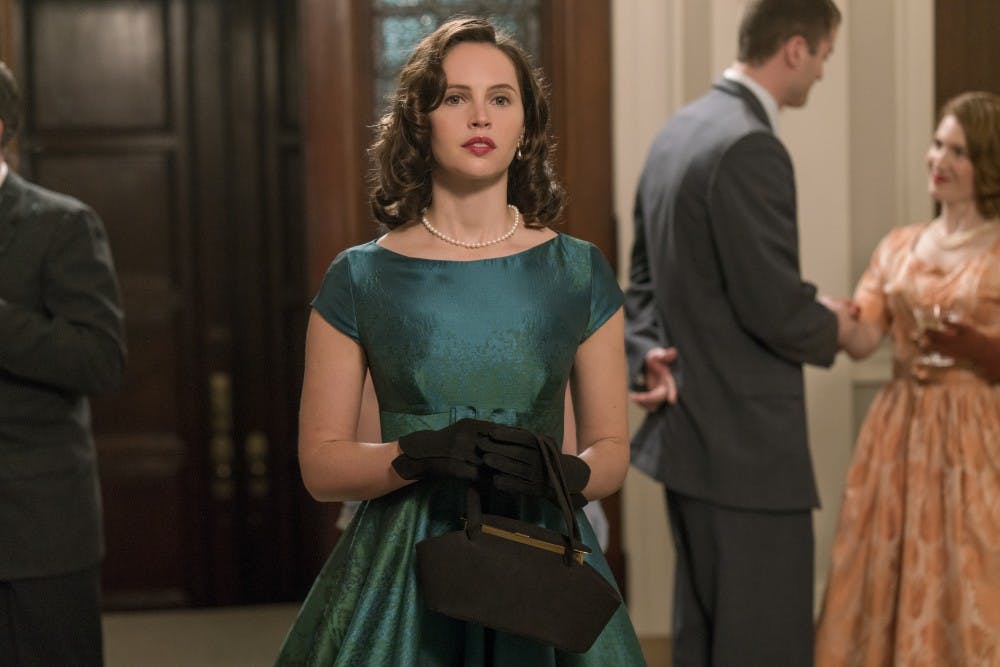Ten thousand men of Harvard want vict'ry today
For they know that o'er old Eli
Fair Harvard holds sway.
These lyrics, from the Harvard fight song, 10,000 Men of Harvard, which is sung in both English and Latin, are one of the first things you’ll hear when you sit down to watch On The Basis of Sex. The lyrics, sang loud and proud, are accompanied by a scene of hundreds of Harvard freshmen (emphasis on "men") donning dark blue and black jackets and trousers walking up the steps to Harvard Law School. From the monotonous waves of suits emerges a single bright blue dress, accompanied by stockings and heels. Enter Ruth Bader Ginsburg—wife, mother, one of nine women to enter Harvard Law's freshman class of 1956, and future United States Supreme Court Justice.
Illegitimum non carborundum
Another lyric from the fight song’s fourth verse, this Latin phrase roughly translates to “don’t let the bastards grind you down"—a very fitting quote for the relentlessness, determination, and good–old fashioned grit that On The Basis of Sex displays in young Ruth Bader Ginsburg.
On the Basis of Sex focuses on Ginsburg’s (Felicity Jones) life as a young woman attending Harvard and Columbia law schools while simultaneously caring for her young daughter, Jane (Cailee Spaeny) and attending classes for her husband, Martin Ginsburg (Armie Hammer), who has just been diagnosed with testicular cancer. As if Ginsburg hasn’t already had her fair share of roadblocks, upon graduation she is faced with rejection from every law firm she applied to—on, you guessed it, the basis of sex. While her husband successfully climbs the ladder at tax law firms, Ginsburg resigns to teaching at Rutgers University until she is presented with the case that would change her career forever. With the help of her family, activist and lawyer Dorothy Kenyon (Kathy Bates), and legal director/occasional asshole Mel Wulf (Justin Theroux), Ginsburg solidifies her position as a lawyer to be taken seriously and a pioneer for women's rights, pushing back against an outdated culture of sexism and the laws that have made it legal.

On the Basis of Sex does a great job of accurately portraying Ginsburg as who she was—a tough, aspiring lawyer and mother during the late 50’s to 70’s—probably due to the fact that the movie’s screenwriter, Daniel Stiepleman, is actually Ginsburg’s nephew. Additionally, the relationships between Ginsburg and both her husband and daughter are truly moving. Mr. Ginsburg is supportive, takes on jobs traditionally reserved for women, like cooking and caring for children, and, most importantly, never lets his genitalia dictate his treatment of and respect for Mrs. Ginsburg. Jane Ginsburg offers a new wave version of defiance and feminism that, at first, causes her to butt heads with her mother, but eventually enhances Mrs. Ginsburg’s fighting spirit and her belief in future generations.
On the Basis of Sex is largely centered around the case of Charles Moritz (Chris Mulkey), a man denied a caregiver tax benefit for not being a woman. Naturally, the movie contains lots of scenes in classrooms and courtrooms that aren’t dramatic or necessarily nail–biters like those we’re used to seeing in Law and Order. The movie assumes the audience is intelligent enough to get at least the gist of the legal terminology and the proceedings used throughout the film in a way that beautifully mirrors Ginsburg’s unapologetic nature in both the courtroom and her life as a whole. The movie is described as a biographical legal drama, and that it is. Don’t expect showy and flashy theatrics or mind–blowing acting that you might see in Bohemian Rhapsody or Vice. On the Basis of Sex is a portrayal of Ginsburg’s legal and personal life in a matter–of–fact way—there’s not a ton of rhyme, but definitely a lot of reason.
On the Basis of Sex, while definitely not the best biopic of 2018, does have a lot to offer. Its substance lies in its authenticity towards Ginsburg’s life as a young academic and lawyer, its unapologetic use of realistic legal jargon, and its ending sentiment. It is an excellent and relevant reminder of our exceptional elders who worked to mend generational divides. It roots for the little guy (or should I say girl), and takes an unwavering stance in the name of justice. Ruth Bader Ginsburg was a remarkable woman who utilized talent, knowledge, and elbow grease to fight a seemingly unwinnable fight and achieve the unthinkable. She deserves to have movies made about her, and we deserve to watch them.







